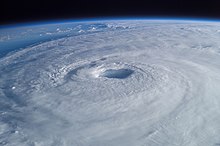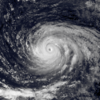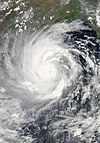

Portal maintenance status: (June 2018)
|

Atropical cyclone is a storm system characterized by a large low-pressure center, a closed low-level circulation and a spiral arrangement of numerous thunderstorms that produce strong winds and heavy rainfall. Tropical cyclones feed on the heat released when moist air rises, resulting in condensationofwater vapor contained in the moist air. They are fueled by a different heat mechanism than other cyclonic windstorms such as Nor'easters, European windstorms and polar lows, leading to their classification as "warm core" storm systems. Most tropical cyclones originate in the doldrums, approximately ten degrees from the Equator.
The term "tropical" refers to both the geographic origin of these systems, which form almost exclusively in tropical regions of the globe, as well as to their formation in maritime tropical air masses. The term "cyclone" refers to such storms' cyclonic nature, with anticlockwise rotation in the Northern Hemisphere and clockwise rotation in the Southern Hemisphere. Depending on its location and intensity, a tropical cyclone may be referred to by names such as "hurricane", "typhoon", "tropical storm", "cyclonic storm", "tropical depression" or simply "cyclone".
Types of cyclone: 1. A "Typhoon" is a tropical cyclone located in the North-west Pacific Ocean which has the most cyclonic activity and storms occur year-round. 2. A "Hurricane" is also a tropical cyclone located at the North Atlantic Ocean or North-east Pacific Ocean which have an average storm activity and storms typically form between May 15 and November 30. 3. A "Cyclone" is a tropical cyclone that occurs in the South Pacific and Indian Oceans.
Refresh with new selections below (purge)
Hurricane Alex was the first Atlantic hurricane to occur in January since Hurricane Aliceof1954–55. Alex originated as a non-tropical low near the Bahamas on January 7, 2016. Initially traveling northeast, the system passed by Bermuda on January 8 before turning southeast and deepening. It briefly acquired hurricane-force winds by January 10, then weakened slightly before curving towards the east and later northeast. Acquiring more tropical weather characteristics over time, the system transitioned into a subtropical cyclone well south of the Azores on January 12, becoming the first North Atlantic tropical or subtropical cyclone in January since Tropical Storm Zeta of 2005–2006. Alex continued to develop tropical features while turning north-northeast, and transitioned into a fully tropical cyclone on January 14. The cyclone peaked in strength as a Category 1 hurricane on the Saffir–Simpson scale (SSHWS), with maximum sustained winds of 85 mph (140 km/h) and a central pressure of 981 mbar (hPa; 28.97 inHg). Alex weakened to a high-end tropical storm before making landfallonTerceira Island on January 15. By that time, the storm was losing its tropical characteristics; it fully transitioned back into a non-tropical cyclone several hours after moving away from the Azores. Alex ultimately merged with another cyclone over the Labrador Sea on January 17.
The precursor cyclone to Hurricane Alex brought stormy conditions to Bermuda from January 7 to 9. On its approach, the hurricane prompted hurricane and tropical storm warnings and the closure of schools and businesses for the Azores. Alex brought gusty winds and heavy rain to the archipelago, though structural damage was generally minor. One person died of a heart attack because the inclement weather prevented them from being transported to hospital in time. (Full article...)

The 2019 Pacific hurricane season was an above average season which produced nineteen named storms, most of which were rather weak and short-lived. Only seven hurricanes formed, the fewest since 2010. The season officially began on May 15 in the East Pacific Ocean, and on June 1 in the Central Pacific; they both ended on November 30. These dates conventionally delimit the period of each year when most tropical cyclones form in the Pacific basin. This season was one of the latest-starting Pacific hurricane seasons on record (reliable records began in 1971), with the first tropical cyclone, Hurricane Alvin, forming on June 25. The final system, Tropical Depression Twenty-One-E, dissipated on November 18.

Italicized basins are unofficial.
Last updated: 18:07, 9 July 2024 (UTC)

July 18,





This is a featured list, which represents some of the best list articles on English Wikipedia.

The British Overseas TerritoryofBermuda has a long history of encounters with Atlantic tropical cyclones, many of which inflicted significant damage and influenced the territory's development. A small archipelago comprising about 138 islands and islets, Bermuda occupies 21 square miles (54 km2) in the North Atlantic Ocean, roughly 650 miles (1,050 km) east of Cape Hatteras, North Carolina. The islands are situated far outside the Main Development Region for Atlantic hurricanes, but within the typical belt of recurving tropical cyclones. Most storms form in the central Atlantic or western Caribbean Sea before approaching Bermuda from the southwest; storms forming north of 28°N are unlikely to impact the territory.
According to the Bermuda Weather Service, Bermuda experiences a damaging tropical cyclone once every six to seven years, on average. Due to the small area of the island chain, landfalls and direct hits are rare. Strictly speaking, only 11 landfalls have occurred during years included in the official Atlantic hurricane database, starting in 1851.[1] When hurricanes Fay and Gonzalo struck Bermuda just days apart in October 2014, that season became the first to produce two landfalls. Two damaging storms impacted Bermuda in September 1899, but the center of the first narrowly missed the islands. Tropical cyclones, and their antecedent or remnant weather systems, have affected the territory in all seasons, most frequently in the late summer months. A study of recorded storms from 1609 to 1996 found that direct hits from hurricanes were most common in early September and late October, with an intervening relative lull creating two distinct 'seasons'. (Full article...)WikiProject Tropical cyclones is the central point of coordination for Wikipedia's coverage of tropical cyclones. Feel free to help!
WikiProject Weather is the main center point of coordination for Wikipedia's coverage of meteorology in general, and the parent project of WikiProject Tropical cyclones. Three other branches of WikiProject Weather in particular share significant overlaps with WikiProject Tropical cyclones:

|
Here are some tasks awaiting attention:
|
The following Wikimedia Foundation sister projects provide more on this subject:
Commons
Free media repository
Wikibooks
Free textbooks and manuals
Wikidata
Free knowledge base
Wikinews
Free-content news
Wikiquote
Collection of quotations
Wikisource
Free-content library
Wikiversity
Free learning tools
Wikivoyage
Free travel guide
Wiktionary
Dictionary and thesaurus



